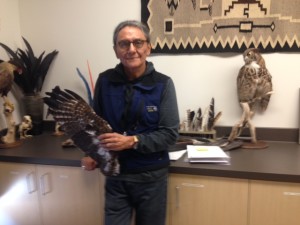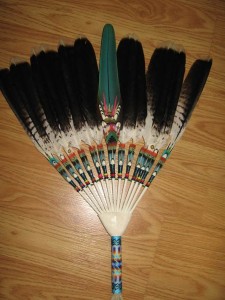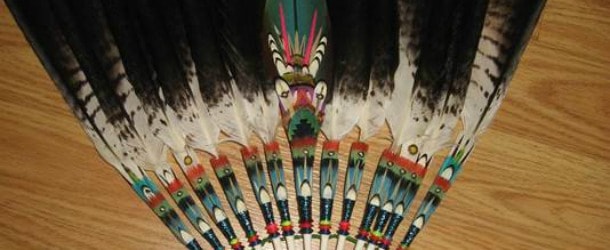
Life after retirement from the U.S. Fish and Wildlife Service (Service) has been anything but leisurely for former Sonoran Joint Venture Coordinator Robert Mesta. Mesta, who retired from the Service and stepped down as SJV Coordinator in 2015, is now coordinating Liberty Wildlife’s Non-Eagle Feather Repository – an innovative Service program that works to conserve migratory birds and preserve Native American cultural traditions.
Located in Scottsdale, AZ, Liberty Wildlife’s Non-Eagle Feather Repository collects bird feathers and parts from zoos, wildlife rehabilitators, wildlife agencies, and other permitted sources, and provides them free of charge to tribal members who apply to the program for use in religious and cultural ceremonies. It is one of only two non-eagle feather repositories in the U.S., the other being the Comanche Nation Ethno-Ornithological Initiative (SIA) based in Cyril, Oklahoma.
These two centers are the only legal way for Native Americans to obtain non-eagle feathers since the Migratory Bird Treaty was enacted 100 years ago. That law, and others such as the Lacy Act of 1900, the Bald and Golden Eagle Protection Act of 1962, and the Endangered Species Act of 1973, have been essential for the continued protection of migratory bird populations, many of which were hunted, trapped, and shot to extinction or near-extinction in the 1800s.
Unfortunately, none of these wildlife laws or public land management schemes included provisions that allowed for the limited collection of native birds for religious and ceremonial purposes. This unintended consequence, in turn, created two significant problems. First, it deprived Native Americans of the feathers needed to create the ceremonial and religious regalia and other sacred implements used in their ceremonies and dances. Thus, many ceremonies and dances were lost over the years.
Second, and most important for the conservation of native birds, it created an illegal black market for feathers. Every year thousands of native birds are taken illegally and sold on the black market because there has not been a source to obtain them legally. For example, a Red-tailed Hawk or Anhinga tail can easily sell for upwards of $250 on the black market. A single juvenile Golden Eagle tail feather can sell for upwards of $500. Mesta estimates that the black market for bird feathers and parts nets illegal traffickers hundreds of thousands of dollars each year.
Beginning in 2007, with the strong support of the Service’s Southwest Regional Director, Dr. Benjamin Tuggle, Mesta was part of a team of biologists that created the Service’s Non-Eagle Feather Repository Program. The two repositories – Liberty Wildlife and SIA – officially began operations in 2010.

Since opening its doors, Liberty Wildlife’s Non-Eagle Feather Repository has distributed bird feathers to approximately 3,000 Native Americans representing 171 different tribes in 43 states. In 2016 alone, the Repository filled more than 400 orders for bird carcasses and feathers and the demand is expected to grow as more people learn about the program.
“We like to say that for every feather order we send out, that’s one less bird that will be taken illegally from the wild,” said Mesta.
Future plans for the Repository include creating an internship program to bring Native American youth to the program to learn about birds and bird conservation, and to reconnect with their cultural traditions.
Coordinating Liberty Wildlife’s Non-Eagle Feather Repository has both personal and professional significance for Mesta, who is a member of the Yaqui tribe of Sonora, Mexico, and the southwestern U.S.
“I was involved in bird conservation my entire career. That, and being Native American, has given me a unique understanding of the ecological and cultural value of animals and their relationship to one another. You can’t have one without the other,” said Mesta. “The Repository is a totally unconventional way of addressing bird conservation. We’re doing it by recycling – recycling feathers. We are giving new life to feathers that can no longer fly,” he added.
As for retirement? Mesta has this message for his former SJV colleagues and partners, “There is life after retirement.” In his case, this couldn’t be truer.
Liberty Wildlife’s Non-Eagle Feather Repository receives bird carcasses and feathers from zoological parks, wildlife rehabilitators, state and federal wildlife agencies, universities, museums, veterinarians, falconers, and other permitted sources. Its success depends on the generous donation of bird carcasses and feathers. If you would like to contribute, please visit Liberty Wildlife for directions, or contact Mesta at the following address:
Robert Mesta
LWNEFR Coordinator
2600 E. Elwood St.
Phoenix, AZ 85040
520-240-7406

